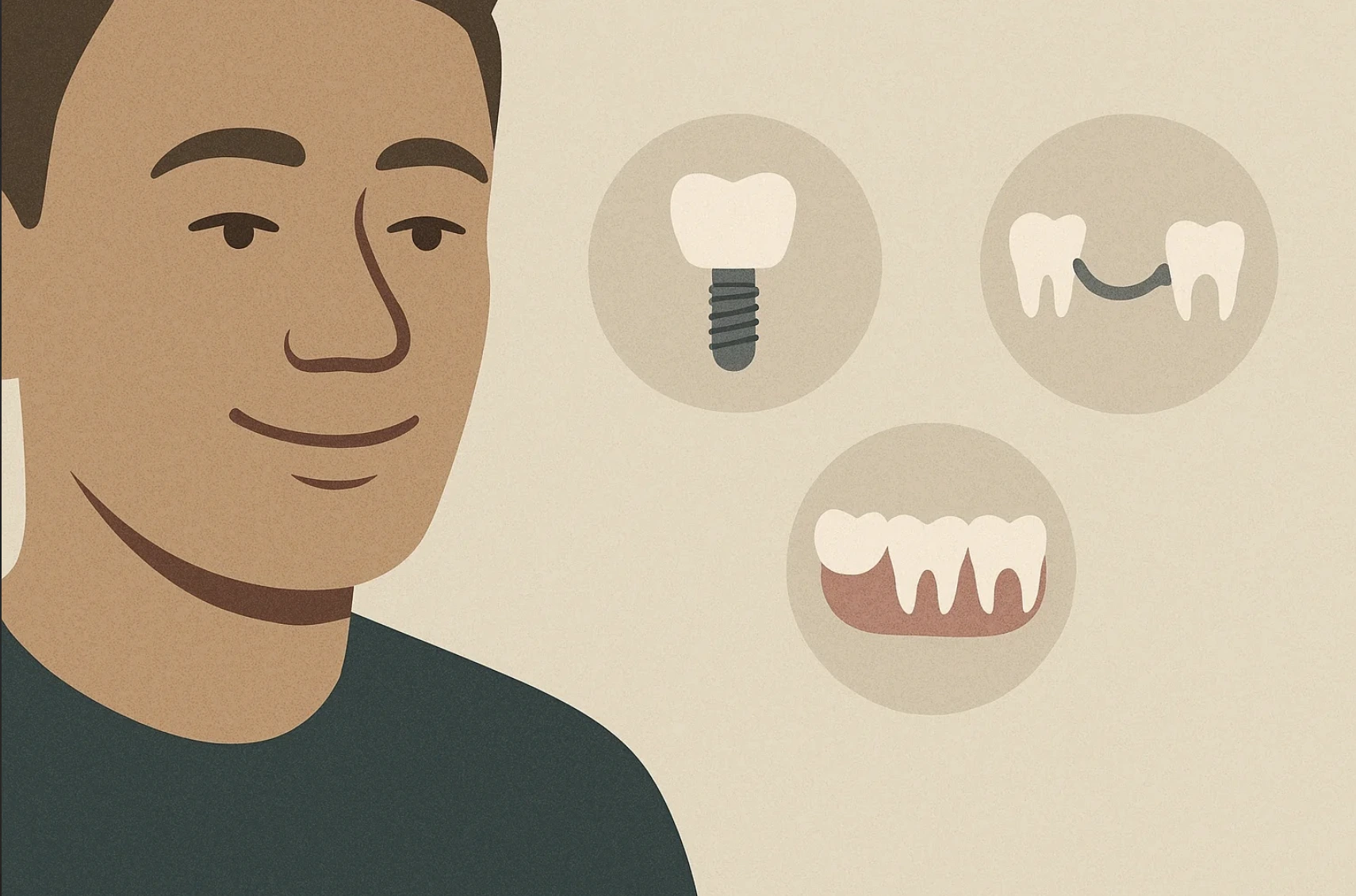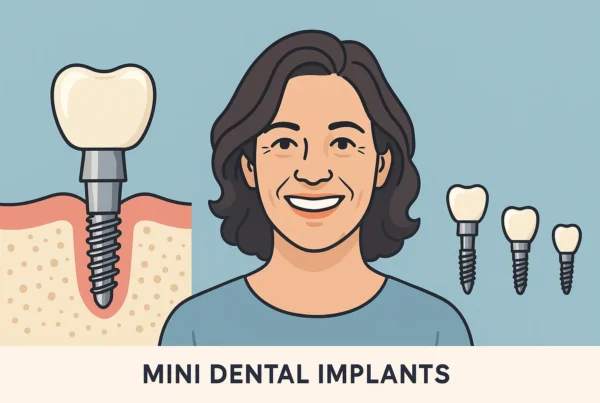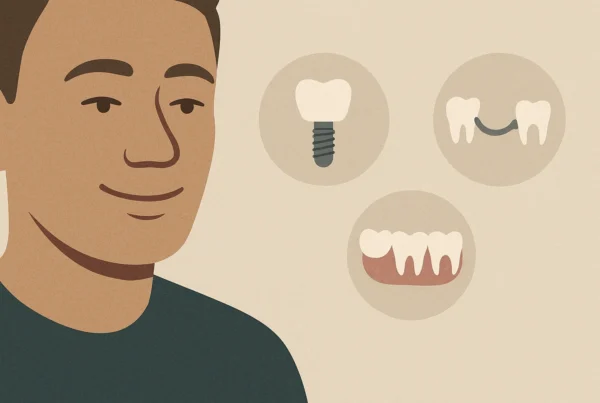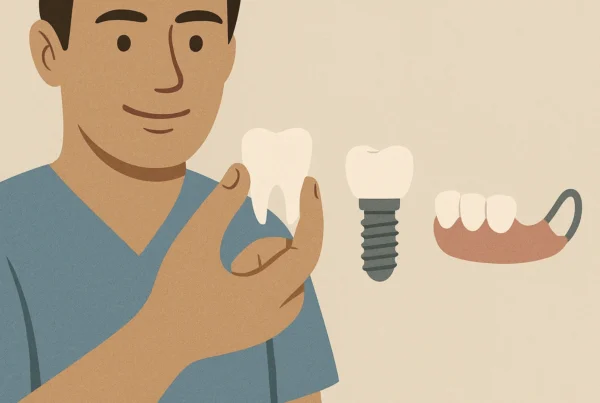Today’s dental implants are one of the best replacement options for missing natural teeth. And because they are the most stable tooth replacements we have today, patients need to understand that dental implant replacement teeth need to be cared for in a very specific way. We explain to our patients that dental implants are a prosthetic, similar to a hip or knee replacement and require specific routine maintenance to provide long-lasting function in the harsh environment we call our mouth.
Regular recall visits to your dentist ensure that your dental implant and surrounding bone and gum tissues remain healthy. It is definitely not a “set it and forget it” treatment. Your dentist will take x-rays every 12 to 18 months to ensure that your jaw bone is healthy around your dental implant. This protocol is unique to dental implants because traditional probing around natural teeth cannot tell you the health of the bone around a dental implant. X-rays are an essential way to keep track of abnormalities that might occur.
Patients should be vigilant with their oral health care, especially around their dental implant. Dental research shows that the oral cavity and the bacteria living inside our mouths need to remain in good balance. Thus if preventive steps are not taken, bad bacteria can overpower the good bacteria. This could cause chronic inflammation, leading to bone loss and creating problems for healthy tissues.
Biofilm is the bacteria that sticks to things in your mouth. If there is disease that forms bad bacteria, it will stick to your natural teeth or dental implants, the disruption and removal of this biofilm is imperative to avoid disease. Biofilm removal is most effectively done with air polishing particles of erythritol or glycine. These very fine particles are sprayed onto the biofilm, blasting it away. “Picking” at natural teeth and especially dental implant replacement teeth with traditional dental scalers or rubber wheel cups is not effective treatment for biofilm removal any more. Once bad bacteria has been controlled in the mouth, special treatment rinses and probiotics may be recommended to keep the mouth healthy long-term in addition to regular recall visits.
Dental implants should be monitored routinely for a disease called peri-implantitis, an infection that affects the bone and gum tissue surrounding a dental implant—It is the direct result of having biofilm disease hanging out around dental implants from poor biofilm management. Peri-implantitis is a disease specific to dental implant replacement teeth. It is the equivalent of periodontal gum disease around natural teeth. Both of these diseases will cause tooth loss.
The bone support around a dental implant is the foundation and the long-term support for health of your implant replacement tooth. If bone is lost and peri-implantitis sets in, this could cause you to lose your implant replacement tooth. Detecting early bone loss around a dental implant gives your dentist an opportunity to perform any early fix needed to keep your implant replacement tooth healthy.
How Current Research and Science Is Helping Us
Science confirms that disease causing bacteria doesn’t go away when a bad tooth is removed. So prior to dental implant treatment, patients with periodontal gum disease need to first get that under control.
Today, dentists have many more tools than ever before to help determine bacteria presence and types that lead to oral health problems. Simple saliva testing can be used to easily determine what kind of bacteria you have in your mouth. The results from this test can determine how prone you are to biofilm disease long-term. Knowing your bacteria profile also identifies your risk for other related health issues like heart disease, high blood pressure, stroke, diabetes, neurologic diseases such as Alzheimer’s and dementia and in the worst case, your potential risk for sudden cardiac death. Over the last decade, these health issues have been linked to several oral bacteria that cause inflammation in our mouths. Having too much of a particular group of five (5) high-risk bad bacteria leads to mouth inflammation that will promote these other health problems. Ask your dentist about this as it can literally save your life.
Is My Dental Implant Tooth Permanent?
With science-backed office maintenance procedures and proper home care, dental implant patients can achieve good oral health and improved overall general health, helping to ensure their dental implant replacement teeth last for a long time. The longest dental implant health record we have in our clinic is 23 years, 7 dental implant replacement teeth placed in 2002 and are still standing strong. In a January 2025 study published by the Brånemark Clinic in Gothenburg, Sweden, the survival rate of 23 dental implants they placed between 1982-1985 was 96%.
The Brånemark Clinic is where dental implant treatment first originated, so this literature of more than 38-40 years now gives clinicians confidence to tell patients that dental implant replacement teeth can last a long time if placed properly and maintained diligently by both the dentist and the patient. “Permanent” is a relative term; how long your brand new car lasts will depend on how it was put together, then how you use it and take care of it. The same for dental implant replacement teeth; if you see an unqualified, inexperienced doctor, chew on inappropriate things and don’t take care of your implant replacement teeth properly as recommended, “permanent” will not be very long.
Finding an AAID Dentist
Looking for an implant dentist? The American Academy of Implant Dentistry provides education and keeps their members updated on the literature and any recent studies concerning implants. As well, there is a good support network in which dentists can work together to support each other. You can go to https://aaid-implant.org/ and find a dentist in your area.
James J Wu, DDS, FRCD(C) is a Clinical Assistant Professor, Department of Oral & Maxillofacial Surgery at Boston University School of Dental Medicine as well as a Clinical Instructor and the Scientific Advisor in Oral Maxillofacial Surgery for the Kois Center for Advancing Dentistry Through Science in Seattle Washington.He is a member of the AAID and a Diplomate of the American Board of Oral Implantology since 2007. Upon completing the curriculum at the Kois Center, he completed the exam process to become a Mentor and was subsequently invited to be a Clinical Instructor to regularly mentor future generations of dentists looking to excel in their profession. Dr. Wu can be reached at drjames@mybrandnewsmile.com
ReNEW Dental
978-451-1500
1201 Main St. Tewksbury, MA 01876
Schedule your consultation today!




